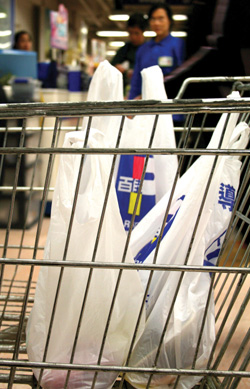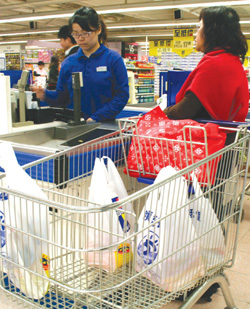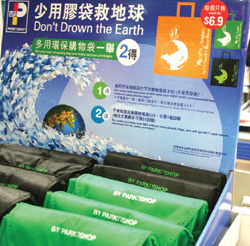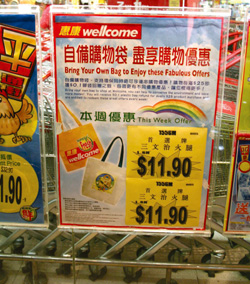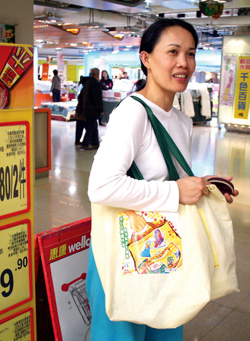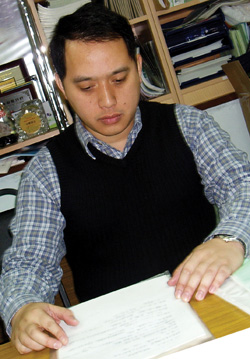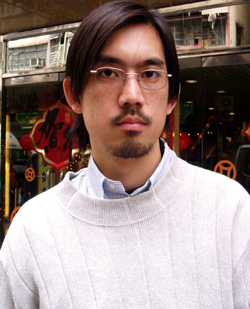Social Issues
Other Stories
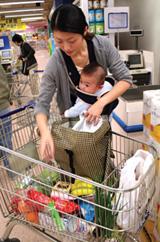
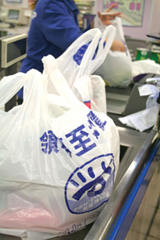
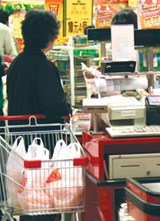
Dannie Zheng
Fewer plastic bags please
by Kitty Lam
Green groups demand more immediate and concrete steps from the government and supermarkets to cut the use of plastic shopping bags, averaging 33 million a day ,one of the highest in the world.
But the two dominant supermarket chains, Wellcome and PARKnSHOP, said they had been encouraging customers to shop with reusable bags.
A recent survey by the Green Student Council found that one out of every 3.9 plastic bags given out was unnecessary despite the reusable bag schemes launched by the supermarket chains last year.
ˇ§We observe that people still use a lot of plastic bags when shopping. The effect is limited,ˇ¨ said Martin Wan Kwok-wai, a campaign officer with the Conservancy Association, another green group.
To tackle the problem, the government is planning to introduce a bill later in the year to provide a legal framework for producer responsibility schemes to regulate products like plastic bags.
The Environment, Transport and Works Bureau will work out a plastic bag reduction target with major supermarket chains and carry out a pilot scheme on the matter, Financial Secretary Henry Tang Ying-yen said in his budget speech.
In the longer term, the government plans to introduce legislation to ban free plastic bags and to levy a tax to deter their use.
Concrete measures of taxing are yet to come.
Green activists welcomed the government's proposals, saying they could be a driving force to help reduce solid waste.
But the government should table the bill in the Legislative Council as soon as possible, they said.
On the possibility of prohibiting free distribution and levying a tax on plastic bags, both Wellcome and PARKnSHOP said the government should thoroughly consult the industry before making any decision.
At present, about 1,000 tonnes of plastic shopping bags are dumped into landfills each day, accounting for 11 per cent of municipal solid waste disposed of in the city, according to government statistics.
Many people do not shop with reusable bags. Some shoppers said supermarkets had not done enough to promote eco-friendly schemes.
ˇ§I saw Wellcome's promotion of reusable shopping bags in the newspapers,ˇ¨ said Mavis Hon, a frequent supermarket shopper. ˇ§However, it occupied such a tiny space in the advertisement pages of items on sale that I always ignored.ˇ¨
Another customer Michelle Chan said cashiers did not mention to her about those schemes of reusable bags or cash rebates.
ˇ§Even when I told them that I had got enough plastic bags, they still gave me a lot,ˇ¨ Ms Chan said.
Wellcome and PARKnSHOP launched rival schemes promoting reusable bags in May 2005 on top of their 10-cent rebate programmes.
Tang Chun-ying, a customer, gave up using reusable bags soon after joining PARKnSHOP's scheme. ˇ§It was inconvenient,ˇ¨ she said.
Under PARKnSHOP's campaign, customers can buy a reusable bag at $6.9. They can get a stamp on a collection card with every purchase of $50 or above if they shop with the bag and do not ask for any plastic bags. They will receive double stamps for buying selected items. The cost of the reusable bag will be given back to the customers when they have got 10 stamps.
Still, in the first month of its promotion, the supermarket already sold 35,000 of the 40,000 reusable shopping bags planned for four months. A spokeswoman for PARKnSHOP said some six million plastic bags were saved in the first six months of the programme.
PARKnSHOP has 220 stores in Hong Kong . The reduction meant a cut of 150 plastic bags used per store per day.
Wellcome, meanwhile, reported a decrease of 16 million in plastic bag consumption between June and December 2005. The figure was 33 per cent higher than the supermarket's reduction target of 12.5 million each year.
The sales of its reusable bags between June and December last year were seven times the total number of 2004, although its scheme does not rebate the cost of the bag to shoppers. Customers, however, can enjoy special discounts for selected items when they shop with the reusable bags.
Diane Chiu Man, group marketing manager of Wellcome, said the results were a great success.
As for the 10-cent refund scheme, Ms Chiu said there was a steady growth in the amount of money rebated since the plan started in 1996, even though customers' shopping behaviour had not changed significantly.
Under the scheme, customers will be given 10 cents back for every $25 spent, and up to $1 per visit, when they check out with their own bags.
ˇ§Some green groups urged that we should increase the rebate to 50 cents, but it is impossible,ˇ¨ Ms Chiu said.
Wellcome would need to refund almost $21 million each year if all the customers shopped with their own bags under the present scheme. The amount could jump to more than $100 million if the rebate rose to 50 cents, Miss Chiu said.
Wellcome has signed an agreement with the Environmental Protection Department to voluntarily reduce its distribution of plastic bags by 40 million through incentives like product discounts until the end of March next year.
The planned reduction is equivalent to 15% of the total plastic bag consumption between April 2004 and March 2005.
But Angus Ho Hon-wai, chairman of the Green Student Council, said that those campaigns promoted by the supermarket chain were more for building up its corporate image and easing public criticism than for discouraging people from using plastic bags.
Statistics showed that the sales of reusable shopping bags in each store were small, Mr Ho said.
ˇ§But the daily business of each store is huge. So I think the schemes are unsuccessful.ˇ¨
He said plastic bags should not be given free and the government must make people pay for their use in the long run.
ˇ§A producer responsibility scheme on plastic bag will be a turning point in the development of environment protection in Hong Kong ,ˇ¨ Mr Ho said.
Supermarket chains, in the meantime, could better train their staff on environmental protection matters and limit the number of plastic bags used in each purchase, the activist said.
His group suggested stores to allow customers to take their shopping goods home in supermarket carts or bags with a deposit of $5 to $10.
Customers have to be educated to use fewer plastic bags, Mr Ho said, as the problem cannot be solved without the participation of shoppers.
The government also has to launch more campaigns to help change the behaviour of the public, he said.
On the proposal of billing plastic bags, Wellcome said if there was a fair and well-organised system, it would follow.
ˇ§A fair and organised system means charging for not only plastic bags in supermarkets but also in all other retail shops,ˇ¨ Ms Chiu said. PARKnSHOP said it might be a complicated and difficult task to implement a levy since there were more than 25,000 retail stores, as well as many other plastic bag import shops and wet markets in Hong Kong .
